Manasi Patwardhan
ResearchGym: Evaluating Language Model Agents on Real-World AI Research
Feb 16, 2026Abstract:We introduce ResearchGym, a benchmark and execution environment for evaluating AI agents on end-to-end research. To instantiate this, we repurpose five oral and spotlight papers from ICML, ICLR, and ACL. From each paper's repository, we preserve the datasets, evaluation harness, and baseline implementations but withhold the paper's proposed method. This results in five containerized task environments comprising 39 sub-tasks in total. Within each environment, agents must propose novel hypotheses, run experiments, and attempt to surpass strong human baselines on the paper's metrics. In a controlled evaluation of an agent powered by GPT-5, we observe a sharp capability--reliability gap. The agent improves over the provided baselines from the repository in just 1 of 15 evaluations (6.7%) by 11.5%, and completes only 26.5% of sub-tasks on average. We identify recurring long-horizon failure modes, including impatience, poor time and resource management, overconfidence in weak hypotheses, difficulty coordinating parallel experiments, and hard limits from context length. Yet in a single run, the agent surpasses the solution of an ICML 2025 Spotlight task, indicating that frontier agents can occasionally reach state-of-the-art performance, but do so unreliably. We additionally evaluate proprietary agent scaffolds including Claude Code (Opus-4.5) and Codex (GPT-5.2) which display a similar gap. ResearchGym provides infrastructure for systematic evaluation and analysis of autonomous agents on closed-loop research.
Routing End User Queries to Enterprise Databases
Jan 27, 2026Abstract:We address the task of routing natural language queries in multi-database enterprise environments. We construct realistic benchmarks by extending existing NL-to-SQL datasets. Our study shows that routing becomes increasingly challenging with larger, domain-overlapping DB repositories and ambiguous queries, motivating the need for more structured and robust reasoning-based solutions. By explicitly modelling schema coverage, structural connectivity, and fine-grained semantic alignment, the proposed modular, reasoning-driven reranking strategy consistently outperforms embedding-only and direct LLM-prompting baselines across all the metrics.
Quality Detection of Stored Potatoes via Transfer Learning: A CNN and Vision Transformer Approach
Jan 02, 2026Abstract:Image-based deep learning provides a non-invasive, scalable solution for monitoring potato quality during storage, addressing key challenges such as sprout detection, weight loss estimation, and shelf-life prediction. In this study, images and corresponding weight data were collected over a 200-day period under controlled temperature and humidity conditions. Leveraging powerful pre-trained architectures of ResNet, VGG, DenseNet, and Vision Transformer (ViT), we designed two specialized models: (1) a high-precision binary classifier for sprout detection, and (2) an advanced multi-class predictor to estimate weight loss and forecast remaining shelf-life with remarkable accuracy. DenseNet achieved exceptional performance, with 98.03% accuracy in sprout detection. Shelf-life prediction models performed best with coarse class divisions (2-5 classes), achieving over 89.83% accuracy, while accuracy declined for finer divisions (6-8 classes) due to subtle visual differences and limited data per class. These findings demonstrate the feasibility of integrating image-based models into automated sorting and inventory systems, enabling early identification of sprouted potatoes and dynamic categorization based on storage stage. Practical implications include improved inventory management, differential pricing strategies, and reduced food waste across supply chains. While predicting exact shelf-life intervals remains challenging, focusing on broader class divisions ensures robust performance. Future research should aim to develop generalized models trained on diverse potato varieties and storage conditions to enhance adaptability and scalability. Overall, this approach offers a cost-effective, non-destructive method for quality assessment, supporting efficiency and sustainability in potato storage and distribution.
SciRAG: Adaptive, Citation-Aware, and Outline-Guided Retrieval and Synthesis for Scientific Literature
Nov 18, 2025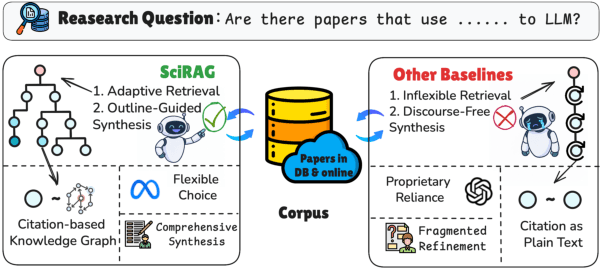

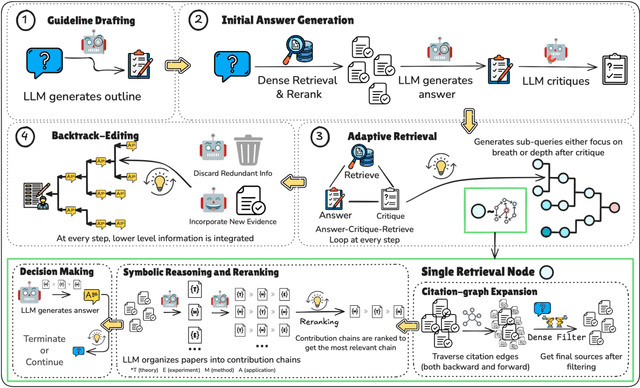
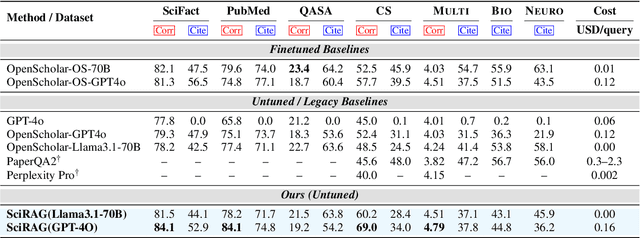
Abstract:The accelerating growth of scientific publications has intensified the need for scalable, trustworthy systems to synthesize knowledge across diverse literature. While recent retrieval-augmented generation (RAG) methods have improved access to scientific information, they often overlook citation graph structure, adapt poorly to complex queries, and yield fragmented, hard-to-verify syntheses. We introduce SciRAG, an open-source framework for scientific literature exploration that addresses these gaps through three key innovations: (1) adaptive retrieval that flexibly alternates between sequential and parallel evidence gathering; (2) citation-aware symbolic reasoning that leverages citation graphs to organize and filter supporting documents; and (3) outline-guided synthesis that plans, critiques, and refines answers to ensure coherence and transparent attribution. Extensive experiments across multiple benchmarks such as QASA and ScholarQA demonstrate that SciRAG outperforms prior systems in factual accuracy and synthesis quality, establishing a new foundation for reliable, large-scale scientific knowledge aggregation.
AbGen: Evaluating Large Language Models in Ablation Study Design and Evaluation for Scientific Research
Jul 17, 2025Abstract:We introduce AbGen, the first benchmark designed to evaluate the capabilities of LLMs in designing ablation studies for scientific research. AbGen consists of 1,500 expert-annotated examples derived from 807 NLP papers. In this benchmark, LLMs are tasked with generating detailed ablation study designs for a specified module or process based on the given research context. Our evaluation of leading LLMs, such as DeepSeek-R1-0528 and o4-mini, highlights a significant performance gap between these models and human experts in terms of the importance, faithfulness, and soundness of the ablation study designs. Moreover, we demonstrate that current automated evaluation methods are not reliable for our task, as they show a significant discrepancy when compared to human assessment. To better investigate this, we develop AbGen-Eval, a meta-evaluation benchmark designed to assess the reliability of commonly used automated evaluation systems in measuring LLM performance on our task. We investigate various LLM-as-Judge systems on AbGen-Eval, providing insights for future research on developing more effective and reliable LLM-based evaluation systems for complex scientific tasks.
Can LLMs Identify Critical Limitations within Scientific Research? A Systematic Evaluation on AI Research Papers
Jul 03, 2025Abstract:Peer review is fundamental to scientific research, but the growing volume of publications has intensified the challenges of this expertise-intensive process. While LLMs show promise in various scientific tasks, their potential to assist with peer review, particularly in identifying paper limitations, remains understudied. We first present a comprehensive taxonomy of limitation types in scientific research, with a focus on AI. Guided by this taxonomy, for studying limitations, we present LimitGen, the first comprehensive benchmark for evaluating LLMs' capability to support early-stage feedback and complement human peer review. Our benchmark consists of two subsets: LimitGen-Syn, a synthetic dataset carefully created through controlled perturbations of high-quality papers, and LimitGen-Human, a collection of real human-written limitations. To improve the ability of LLM systems to identify limitations, we augment them with literature retrieval, which is essential for grounding identifying limitations in prior scientific findings. Our approach enhances the capabilities of LLM systems to generate limitations in research papers, enabling them to provide more concrete and constructive feedback.
ResearchCodeAgent: An LLM Multi-Agent System for Automated Codification of Research Methodologies
Apr 28, 2025
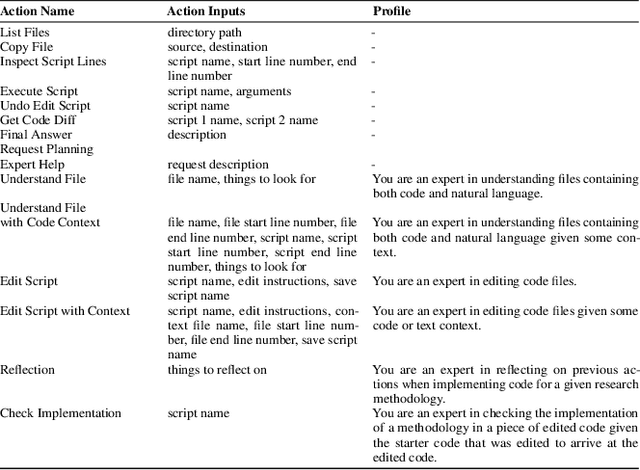
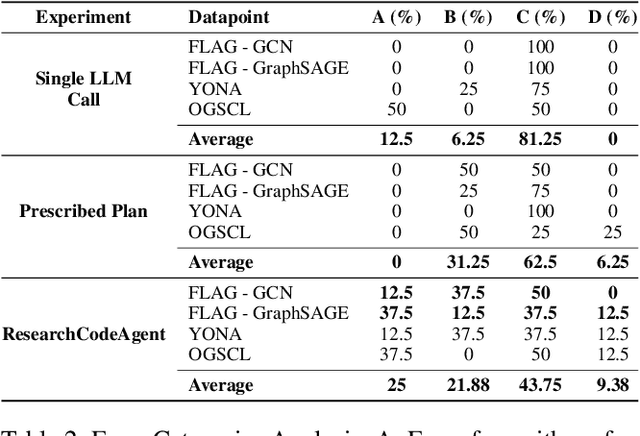
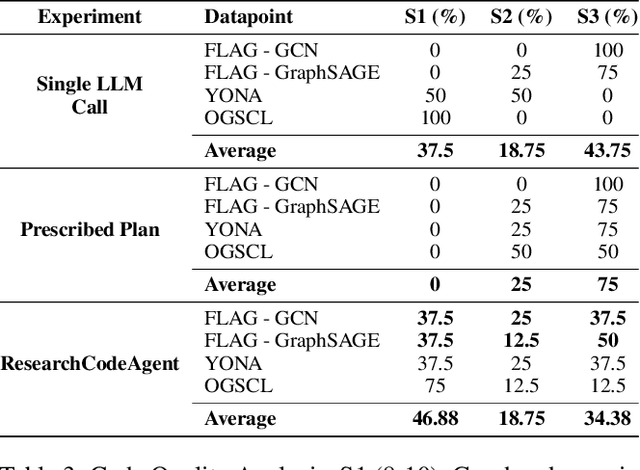
Abstract:In this paper we introduce ResearchCodeAgent, a novel multi-agent system leveraging large language models (LLMs) agents to automate the codification of research methodologies described in machine learning literature. The system bridges the gap between high-level research concepts and their practical implementation, allowing researchers auto-generating code of existing research papers for benchmarking or building on top-of existing methods specified in the literature with availability of partial or complete starter code. ResearchCodeAgent employs a flexible agent architecture with a comprehensive action suite, enabling context-aware interactions with the research environment. The system incorporates a dynamic planning mechanism, utilizing both short and long-term memory to adapt its approach iteratively. We evaluate ResearchCodeAgent on three distinct machine learning tasks with distinct task complexity and representing different parts of the ML pipeline: data augmentation, optimization, and data batching. Our results demonstrate the system's effectiveness and generalizability, with 46.9% of generated code being high-quality and error-free, and 25% showing performance improvements over baseline implementations. Empirical analysis shows an average reduction of 57.9% in coding time compared to manual implementation. We observe higher gains for more complex tasks. ResearchCodeAgent represents a significant step towards automating the research implementation process, potentially accelerating the pace of machine learning research.
IRIS: Interactive Research Ideation System for Accelerating Scientific Discovery
Apr 23, 2025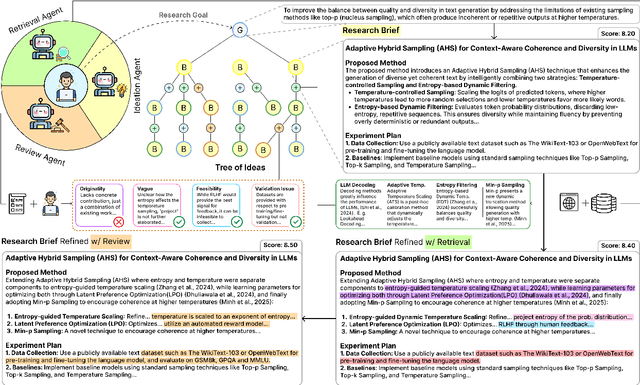
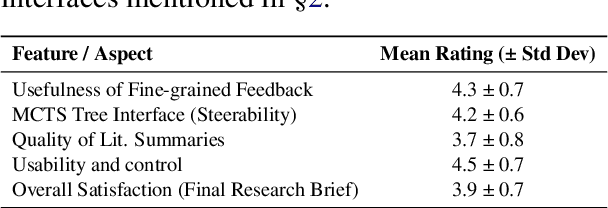
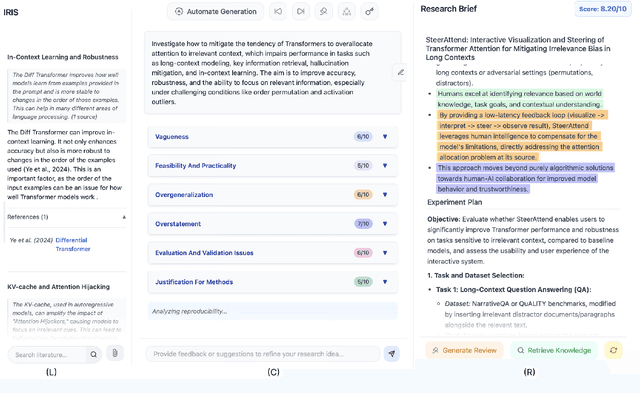
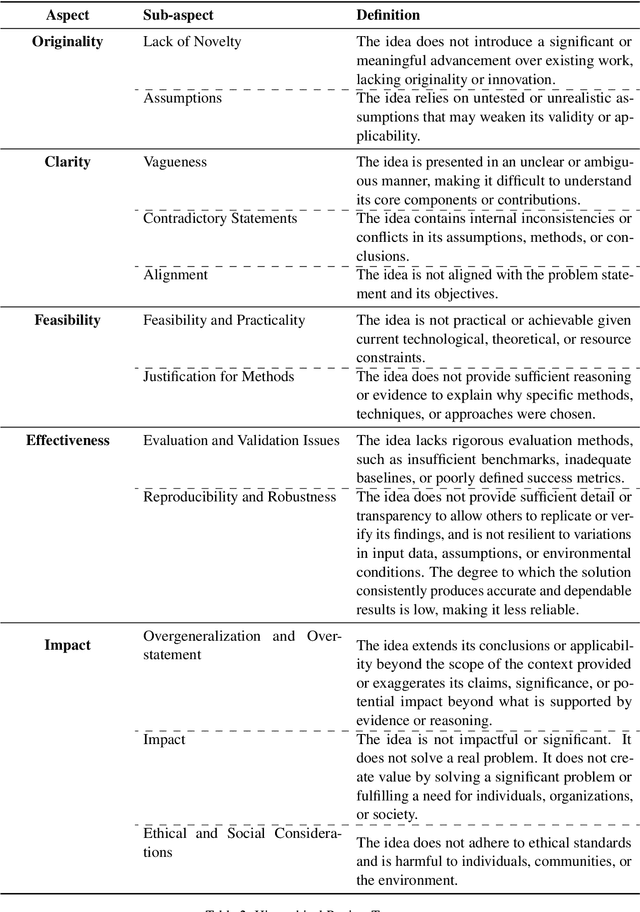
Abstract:The rapid advancement in capabilities of large language models (LLMs) raises a pivotal question: How can LLMs accelerate scientific discovery? This work tackles the crucial first stage of research, generating novel hypotheses. While recent work on automated hypothesis generation focuses on multi-agent frameworks and extending test-time compute, none of the approaches effectively incorporate transparency and steerability through a synergistic Human-in-the-loop (HITL) approach. To address this gap, we introduce IRIS: Interactive Research Ideation System, an open-source platform designed for researchers to leverage LLM-assisted scientific ideation. IRIS incorporates innovative features to enhance ideation, including adaptive test-time compute expansion via Monte Carlo Tree Search (MCTS), fine-grained feedback mechanism, and query-based literature synthesis. Designed to empower researchers with greater control and insight throughout the ideation process. We additionally conduct a user study with researchers across diverse disciplines, validating the effectiveness of our system in enhancing ideation. We open-source our code at https://github.com/Anikethh/IRIS-Interactive-Research-Ideation-System
DBRouting: Routing End User Queries to Databases for Answerability
Jan 27, 2025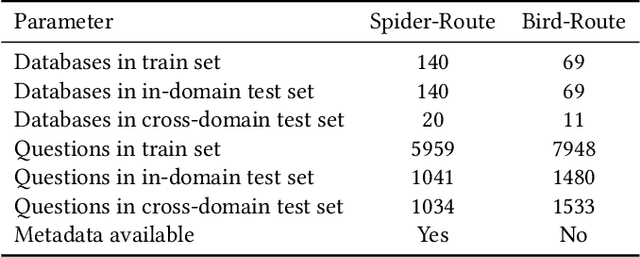


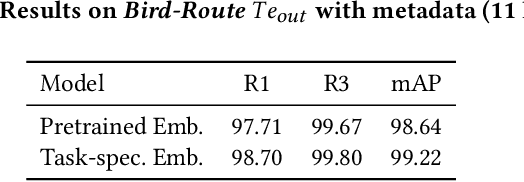
Abstract:Enterprise level data is often distributed across multiple sources and identifying the correct set-of data-sources with relevant information for a knowledge request is a fundamental challenge. In this work, we define the novel task of routing an end-user query to the appropriate data-source, where the data-sources are databases. We synthesize datasets by extending existing datasets designed for NL-to-SQL semantic parsing. We create baselines on these datasets by using open-source LLMs, using both pre-trained and task specific embeddings fine-tuned using the training data. With these baselines we demonstrate that open-source LLMs perform better than embedding based approach, but suffer from token length limitations. Embedding based approaches benefit from task specific fine-tuning, more so when there is availability of data in terms of database specific questions for training. We further find that the task becomes more difficult (i) with an increase in the number of data-sources, (ii) having data-sources closer in terms of their domains,(iii) having databases without external domain knowledge required to interpret its entities and (iv) with ambiguous and complex queries requiring more fine-grained understanding of the data-sources or logical reasoning for routing to an appropriate source. This calls for the need for developing more sophisticated solutions to better address the task.
BudgetMLAgent: A Cost-Effective LLM Multi-Agent system for Automating Machine Learning Tasks
Nov 12, 2024
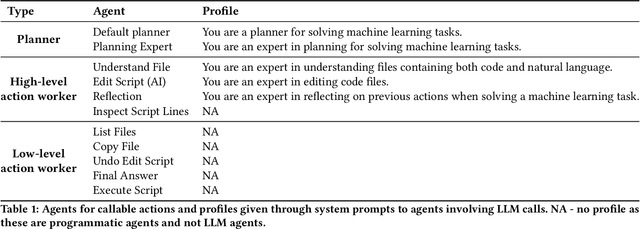
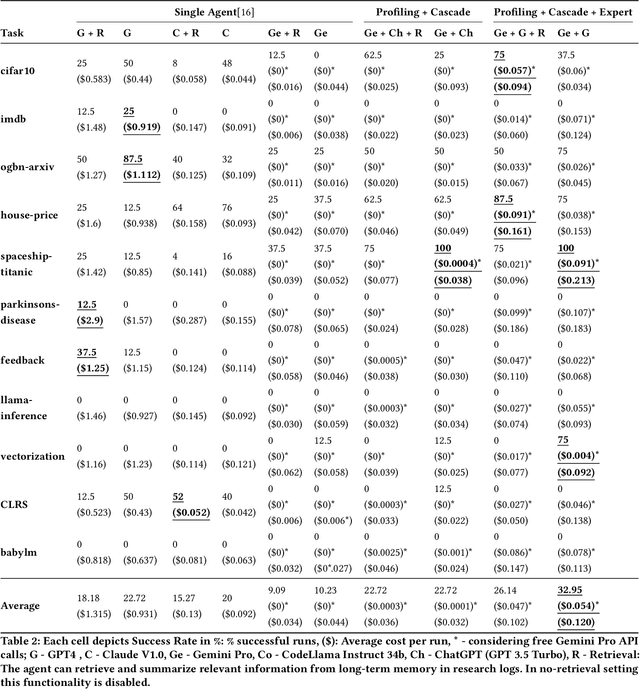
Abstract:Large Language Models (LLMs) excel in diverse applications including generation of code snippets, but often struggle with generating code for complex Machine Learning (ML) tasks. Although existing LLM single-agent based systems give varying performance depending on the task complexity, they purely rely on larger and expensive models such as GPT-4. Our investigation reveals that no-cost and low-cost models such as Gemini-Pro, Mixtral and CodeLlama perform far worse than GPT-4 in a single-agent setting. With the motivation of developing a cost-efficient LLM based solution for solving ML tasks, we propose an LLM Multi-Agent based system which leverages combination of experts using profiling, efficient retrieval of past observations, LLM cascades, and ask-the-expert calls. Through empirical analysis on ML engineering tasks in the MLAgentBench benchmark, we demonstrate the effectiveness of our system, using no-cost models, namely Gemini as the base LLM, paired with GPT-4 in cascade and expert to serve occasional ask-the-expert calls for planning. With 94.2\% reduction in the cost (from \$0.931 per run cost averaged over all tasks for GPT-4 single agent system to \$0.054), our system is able to yield better average success rate of 32.95\% as compared to GPT-4 single-agent system yielding 22.72\% success rate averaged over all the tasks of MLAgentBench.
 Add to Chrome
Add to Chrome Add to Firefox
Add to Firefox Add to Edge
Add to Edge